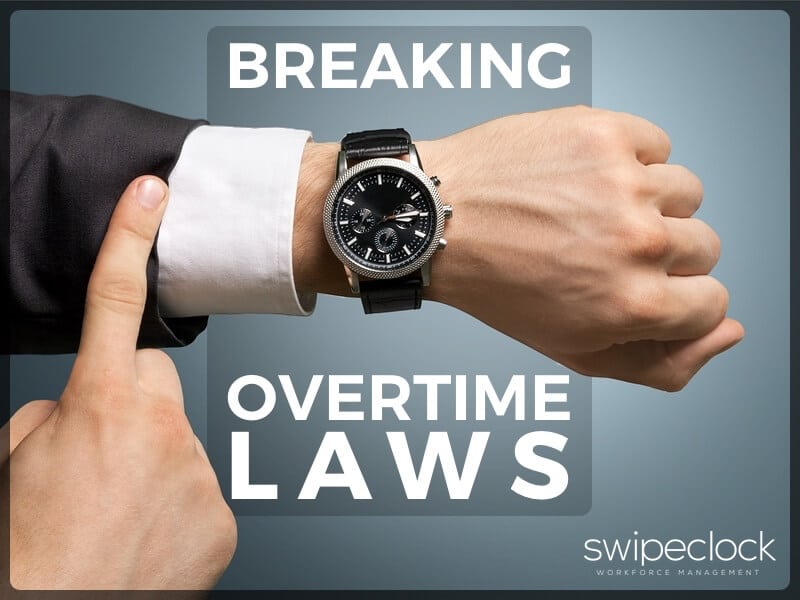Avoid FLSA Fines: Critical Checklist For Small Business Overtime Laws

The Fair Labor Standards Act has been around since 1938. Regardless, thousands of employers fail to comply. Breaking overtime laws (either knowingly or unknowingly) is one of the most common violations. Some violators are well known multi-million dollar corporations.
Recent judgments for breaking overtime laws are staggering. Don’t high-profile companies know better? One would think.
Smart business owners learn from mistakes—other people’s. Here are some of the lessons we can learn.
Lessons From Whopping FLSA Fines
- Businesses of all sizes are fined for FLSA violations.
- Common errors can result in astronomical judgments.
- Small business owners can learn from mistakes made by big companies.
- Inexpensive time and attendance tracking systems can protect you from violating FLSA laws.
Let’s look at some colossal settlements from the past two years. Then we will describe how employee time and attendance software can protect you.
FedEx 240 Million Dollar Lesson
- Make sure independent contractors meet IRS criteria
This FLSA judgment will go down in history. Drivers the company had classified as independent contractors didn’t qualify under IRS rules. FedEx was ordered to pay over 12,000 employees back wages for unpaid overtime.
MetLife 50 Million Dollar Lesson
- Correctly classify nonexempt employees
The claimants were former LTD (Long Term Disability) Claim Specialists. Up until 2013, these employees were paid hourly. As non-exempt, they were also paid overtime when they exceeded 40 hours a week. According to the plaintiffs, weekly overtime work was common.
In 2013, MetLife reclassified the LTD Claims Specialists as overtime-exempt salaried employees. Since their job duties didn’t change, MetLife was asking for trouble.
The plaintiffs claimed that the LTD Claims Specialists continued to work 45-60 hour weeks. The judge agreed that the employees were due overtime pay.
Classification affects more than overtime laws. It can impact benefits eligibility, minimum wage requirements, and workers’ comp eligibility. Employers who violate could face state as well as FLSA penalties.
T.G.I. Fridays 19.1 Million Dollar Lesson(s)
- Don’t require off-the-clock work
- Don’t violate meals/breaks laws
- Know tip laws
Thank goodness this wasn’t your company. T.G.I. Fridays hit a grand slam when it comes to FLSA violations. Unpaid overtime, work without pay, and shorted wages. They also violated minimum wage laws due to faulty tip crediting and pooling.
T-Mobile 19 Million Dollar Lesson
- Compensate correctly for on-call time
T-Mobile required workers to be “on standby” for up to a week at a time. When on call, employees had to be ready to come into work if needed—around the clock. If they weren’t called in, they received a $22.47 flat rate per day instead of their hourly rate.
The plaintiffs successfully argued that the time on call should have been counted as working hours. T-Mobile was found to have violated California and FLSA laws for minimum wage, overtime, and off-the-clock work.
Walgreens 13.5 Million Dollar Lesson(s)
- Pay employees for hours spent training
- Know your state laws regarding uniform maintenance and fair scheduling
Former Walgreens pharmacists sued for back wages for training time. Walgreens was also found guilty of requiring pharmacists to work more than seven days in a row without a rest day. In violation of California labor law, the employees were not paid for time spent maintaining their uniforms.
GE 9.5 Million Dollar Lesson
- Don’t discourage employees from claiming legitimate overtime
GE service technicians were required to travel to jobs and answer emails in addition to their primary tasks. They claimed that their supervisors discouraged them from reporting time spent on these support duties. It appears that the supervisors knew the service technicians were due overtime, but they used intimidation to keep them from reporting it.
Small Employer Checklist for Overtime Laws
- Make sure overtime exempt employees meet FLSA duties test (see below)
- Make sure independent contractors meet the IRS criteria
- Don’t require off-the-clock work
- Know overtime laws regarding piece rate work
- Know tip laws
- Compensate correctly for “call-in” shifts
- Compensate correctly for “on-call” work
- Know meals/break laws
- Pay employees for training hours
SwipeClock Works Overtime To Keep You Compliant
SwipeClock has inexpensive web-based tools to help you avoid breaking overtime laws:
- Alerts for overtime hour thresholds
- Meal/break lockout for early clock in of mandatory breaks
- Overtime calculation by job code
- Tip reporting
- Flexible scripting for state or local overtime laws
- Advanced scheduling with overtime rules
- Creates records for reporting
What Qualifies For Exemption From Overtime Laws?
The Department of Labor lists four categories of employees who are exempt from both overtime laws and minimum wage laws. This is sometimes called the “white collar” exemption.
To be exempt, employees must meet the duties test for all requirements. Remember, it’s the actual job duties that count, not the job title. Incidentally, the attempt to raise the salary threshold in 2016 did not affect the classification rules.
Executive
- Salaried making not less than $455 per week
- Primary duties: managing the enterprise, managing a department of at least two employees
- Hire and fire authority
Administrative
- Salaried making not less than $455 per week
- Primary duties: administrative work directly related to the management of the business
- Must be able to exercise of discretion and independent judgment
Learned Professional Exemption
- Salaried making not less than $455 per week
- Work predominantly intellectual in character requiring consistent exercise of judgment
- Possesses advanced knowledge acquired through prolonged specialized instruction
Creative Professional Exemption
- Salaried making not less than $455 per week
- Work requiring “invention, imagination, originality, or talent”
Computer Employee Exemption
- Salaried making not less than $455/week or $27.63/hour
- Computer systems analyst, computer programmer, software engineer or similar
Outside Sales Exemption
- Duties: sales, obtaining contracts
Highly Compensated Exemption
- Salary greater than $100,000 per year
- Regularly perform at least one of the duties of exempt executive, administrative, or professional
For more detailed instructions, visit Department of Labor, Wage and Hour Division.
Other Practices That Could Violate FLSA Overtime Laws
The knee joint’s connected to the shin bone. Labor laws are also interconnected. Breaking a classification provision can violate overtime laws. Breaking an overtime law can violate minimum wage. Here are some issues that have tripped up employers:
Docking Pay From An Overtime-Exempt Employee
An employee who is exempt from overtime laws has other rights under the FLSA. One of these is being paid for an entire day even when working less than eight hours. If an employee takes off for part of the day, it doesn’t allow the employer to withhold pay. If a salaried exempt employee leaves during the day—for any reason—the worker can’t have their pay docked. However, an employer can generally take other disciplinary actions.
Withholding Pay For Uniform Expenses
Two Walt Disney companies were required to pay 3.8 million for various FLSA infractions. One problem was allowing hourly rates to fall below minimum wage. This was partly due to paycheck deductions for uniforms. (Another problem was requiring work before clocking in.)
Be Proactive About Compliance
SwipeClock understands how time-consuming FLSA compliance can be. Not to mention the Affordable Care Act and Payroll Based Journal. There are also state and local laws governing overtime, family leave, and scheduling. Without specialized tools, compliance becomes a full-time job.
With our Workforce Management products, you take a systematic approach to compliance. Set rules based on your industry, local laws, and pay structure. Then automation takes over. It’s the only way to have compliance peace of mind.
Introducing Workforce HUB From SwipeClock
Looking for a comprehensive Workforce Management solution? Our new Workforce HUB has everything you need for timekeeping, scheduling, payroll, compliance, and HR. For more information visit SwipeClock Workforce HUB.
About SwipeClock
SwipeClock is a leading provider of simple and affordable integrated workforce management services that provide intuitive employee access to integrated automated time and attendance, scheduling, leave management, HR dashboards, and other HR resources.
The company’s cloud products (WorkforceHUB, TimeWorksPlus, TimeSimplicity) and hardware clocks (TimeWorksTouch and TimeWorksTUFF and others) enable employers to manage their most important and expensive asset—employees—by transforming labor from a cost of doing business to a competitive advantage.
SwipeClock’s workforce management solutions are sold through over 900 partners that empower more than 30,000 businesses to lower labor costs, comply with regulatory mandates, and maximize profits.
By Liz Strikwerda
Simplify HR management today.
Simplify HR management today.
Your Guide to GPS Time Tracking (Geofencing)
Updated March 19, 2024 When your business has employees working remotely or at various job sites, time tracking can become a challenge, particularly if the company relies on physical clocks for punching in and out. But offering a mobile app or web-based tracking solution can cause some concerns. You might wonder whether employees are clocking…
Read MoreThe Employer’s Guide to Federal & State Meal/Rest Break Laws [See all 50 State Laws Here]
Updated January 23, 2024 Under the federal Fair Labor Standards Act (FLSA), employers are not required to provide meal or rest break periods to employees. However, some states do have laws in effect dictating when and how often an employee should receive a break, as well as whether these breaks are paid or unpaid. In…
Read More





